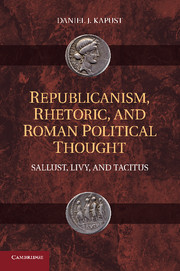Book contents
- Frontmatter
- Contents
- Acknowledgments
- 1 Introduction
- 2 An Ambiguous Republican
- 3 Channeling Conflict through Antagonistic Rhetoric in the War with Catiline
- 4 Exemplarity and Goodwill in Livy's From the Founding of Rome
- 5 Tacitus on Great Men, Bad Rulers, and Prudence
- 6 Tacitus' Moral Histories
- Epilogue
- Bibliography
- Index
- References
2 - An Ambiguous Republican
Sallust on Fear, Conflict, and Community
Published online by Cambridge University Press: 03 May 2011
- Frontmatter
- Contents
- Acknowledgments
- 1 Introduction
- 2 An Ambiguous Republican
- 3 Channeling Conflict through Antagonistic Rhetoric in the War with Catiline
- 4 Exemplarity and Goodwill in Livy's From the Founding of Rome
- 5 Tacitus on Great Men, Bad Rulers, and Prudence
- 6 Tacitus' Moral Histories
- Epilogue
- Bibliography
- Index
- References
Summary
INTRODUCTION
In the first chapter, we encountered the connection between eloquence and liberty in Cicero's thought. Closely linked, the prior was a sign of the latter, not just accompanying, but giving structure and direction to liberty. Oratory arose in conditions of peace, and in turn fostered peace and unity for Cicero: As he has Crassus put it in On the Ideal Orator, eloquence “has ever flourished, ever reigned supreme in every free nation and especially in quiet and peaceful communities.” We have also seen the way in which contemporary studies of republicanism and rhetoric view the role of rhetoric and persuasion in republican political communities: They foster the pursuit of the public good; the conditions of speaking freely are the conditions of liberty; rhetoric serves as a resource for fostering engagement and trust among citizens.
For writers valuing rhetoric for these reasons, the community is not monolithic; rather, the community is the site of conflict and contestation between distinct individuals and groups, conflict and contestation that can be channeled and treated through rhetoric and checked by civic virtue. Unanimity is not the goal; rather, it is consensus in the face of conflict, potential or actual. Yet conflict and contestation always have the potential to get out of hand and to undermine the community itself, and so, too, does the practice of rhetoric.
- Type
- Chapter
- Information
- Republicanism, Rhetoric, and Roman Political ThoughtSallust, Livy, and Tacitus, pp. 27 - 52Publisher: Cambridge University PressPrint publication year: 2011



